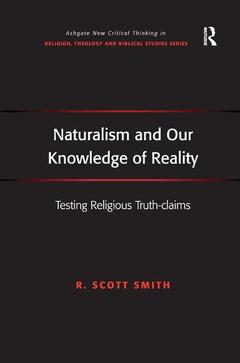Description
Naturalism and Our Knowledge of Reality
Testing Religious Truth-claims
Routledge New Critical Thinking in Religion, Theology and Biblical Studies Series
Author: Smith R. Scott
Language: English
Subject for Naturalism and Our Knowledge of Reality:
Keywords
Papineau’s Theory; Naturalism’s Dominance; Token Brain States; Phenomenal Concept; Sense Datum View; Nonreductive Physicalism; Logical Relations; Direct Realist Views; Ontological Resource; Immaterial Entities; MIT Press; Causal Covariation; Intentional Stance; Eliminative Materialism; Conscious Properties; Direct Realism; Veridical Perception; Folk Psychology; Intended Object; Follow; Methodological Naturalism; Dry Socket; Euthyphro Dilemma; Quine's Thesis; God’s Character
Publication date: 12-2011
Support: Print on demand
Publication date: 12-2021
· 15.6x23.4 cm · Paperback
Description
/li>Contents
/li>Biography
/li>




